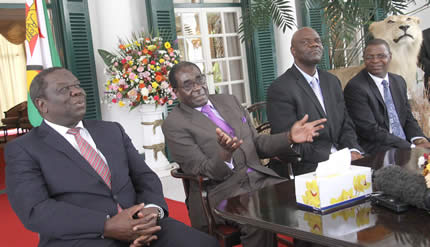Principals resolve Copac row

President Mugabe, Prime Minister Morgan Tsvangirai and Deputy Prime Minister Arthur Mutambara met at State House and received a report from the Cabinet committee tasked with resolving contentious issues.
The three met behind closed doors for over two hours before hammering a solution to the sticky issues.
MDC leader Professor Welshman Ncube later joined other party leaders and they together announced the outcome of the meeting.
Addressing journalists after the meeting, President Mugabe confirmed that the three parties had agreed on all disputed areas.
“We are glad to say that we have come to the conclusion of the exercise.
“All parties are agreed but sure there will be some ‘Ts’ to cross and some ‘Is’ to dot, but we are generally agreed to the finalisation of the draft.”
The President said the resolved outstanding issues would now be incorporated into the draft Constitution released last July.
“After the completion of the draft, we will make a proclamation as to the way forward, that is stipulating our roadmap and state when the referendum will be held and indicate also when our elections would be forthcoming,” he said.
More. . .
The President acknowledged that the process had been challenging, but urged Zimbabweans to remain focused.
“There were so many teething areas. A Constitution is about how a country should be ruled and it has organs of Government so people discussed these organs as well as the executive powers of the President, the Judiciary and other ancillary matters.
“So as you do so along the way, there will be difficulties, but let’s not look at the difficulties . . . these are now part of history. Let’s now look at what has been agreed on because it is what is going to serve us in the future.”
The Head of State and Government and Commander-in-Chief of the Zimbabwe Defence Forces thanked all the political parties, civic groups and individuals involved in the Constitution-making process.
“I would like to express gratitude to all those involved in the exercise, to all our three parties, the other groups who were involved, for their participation and the contribution they made towards the conclusion we have witnessed today,” he said.
“At least we have come to the end of this marathon exercise. To our principals, the parties and the people, congratulations.”
PM Tsvangirai said the agreement was a defining moment for Zimbabwe.
“I would like to join President Mugabe in confirming that we have reached a defining moment. I am sure that the people’s patience had been tested . . . but I am glad to say this concludes a long journey,” he said.
PM Tsvangirai said he hoped the new Constitution would last for posterity.
“A Constitution is a social contract of the people, it is not about individuals and I am sure that this document will be a living document Your Excellency that will represent the aspirations of the people of Zimbabwe,” he said.
DPM Mutambara said the parties had found each other and compromised during negotiations and urged Zimbabweans to concentrate on issues that unite them.
“This was as a result of political will, where there is political will leaders are able to solve problems.
“Another issue is that if we have national interest we will realise that there is more that unite us than divide us. The reason we are here is that we emphasised on what unite us and de-emphasised what divide us,” DPM Mutambara said.
MDC president Prof Ncube said: “The meeting, which took place ended in consensus on all issues outstanding in respect of the constitution of Zimbabwe. What is left now is to go and incorporate all agreed principles into the July 2012 draft with which we can take to the referendum as expeditiously as possible.”
The constitution-making process has been mired by various challenges since it commenced in 2009.
The process was initially scheduled to be completed within 18 months from the date of commencement but took over three years and gobbled US$45 million because of differences among the three political parties in the inclusive Government and financial problems.
The latest differences arose after the production of the draft in July when Zanu-PF argued that the document deviated from what the people said during the outreach programme as contained in the National Statistical Report.







Comments